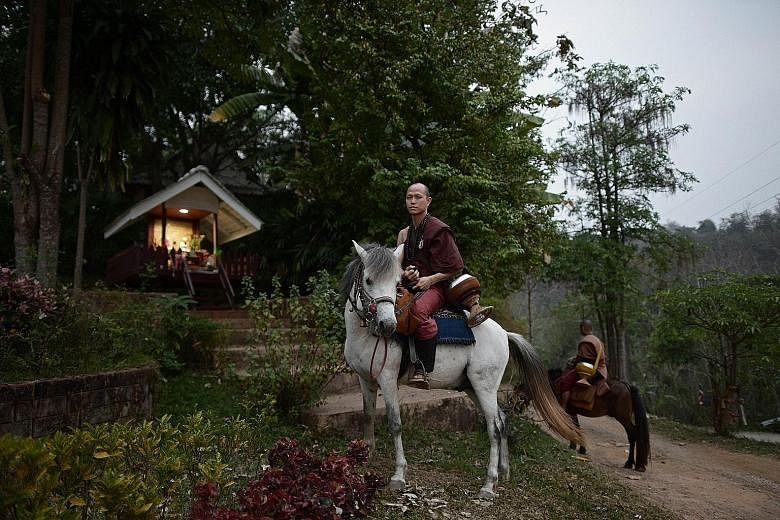MAE CHAN (Thailand) • Every morning in Thailand's far north, a convoy of orange-robed Buddhist monks and novices riding on horseback leave their mountain-top temple in the kingdom's notorious Golden Triangle region to collect alms.
At first glance they look like a throwback to a forgotten era - but they are in fact part of an innovative drive to help young boys in this drug-ravaged region escape addiction through horse riding, Thai boxing and meditation.
The monks have become social workers of a sort in the isolated region, where few government services reach.
Once famed for its opium and heroin, the main substance manufactured and trafficked through the Golden Triangle is now methamphetamine.
"I barely had food to eat because my dad was a drug addict and didn't work," said Ponsakorn Mayer, one of the novices who rides along the steep slopes surrounding the monastery every day.
Like many young boys in this mountainous region where rampant drug-trafficking has decimated successive generations, he sought refuge at the Temple of the Golden Horse.
Now, his days are packed with meditation, horse riding and traditional Muay Thai boxing.
Perched on a lush, green mountain in the kingdom's northernmost Chiang Rai province, the temple sits in the heart of the so-called Golden Triangle - an area comprising parts of northern Thailand and neighbouring Myanmar and Laos.
With a Thai boxing champion to provide instruction and a stable of horses to be cared for and exercised, the monastery aims to stimulate the young boys who come from local families hit by drug addiction, alongside the more mainstream classes provided by the temple.
The majority of novices, who often suffer from malnutrition when they arrive at the temple, are orphans or were abandoned there by their drug-taking parents.
"Hill tribe people have tough lives, it's partly why they often take drugs and struggle to care for their kids," said the temple's principal monk Pra Sutipong.
The United Nations Office on Drugs and Crime estimates that each year, in this area, more than 1.5 billion "yaba" pills - the Thai name for a tablet containing methamphetamine and caffeine - are manufactured in the vicinity.
This takes place mostly in small mobile laboratories in isolated jungle areas in Shan state in neighbouring Myanmar.
"Drugs are the big problem in the northern region of Thailand... there are not enough rehab centres," said Mr Apisak Wittayanookulluk, deputy director of Thanyarak rehab centre in Chiang Mai. "Prevention needs to be developed, especially in schools, as nowadays users and dealers are getting younger and younger," he said.
At the temple, the novices spend much of their time on routine daily tasks: feeding and caring for the animals, especially the horses. They also study the basics of agriculture and cultivation.
The ultimate goal of the programme, temple monks say, is to provide a sense of discipline and help the children see they are responsible for their own lives.
AGENCE FRANCE-PRESSE

